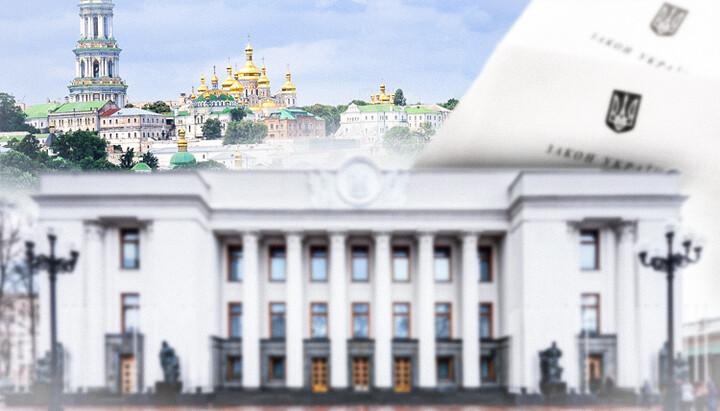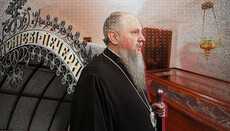Anti-Church ES and Servants of the People’s law: what happens if passed

24 "EU" and "Servants of the People" MPs have submitted to the Rada an anti-UOC bill. We analyze the main provisions and give a forecast of how the situation will develop.
On December 5, "EU" MPs and "Servants of the People" MPs submitted to the Rada bill 8262 "On Amendments to Certain Legislative Acts of Ukraine regarding the Improvement of the Legal Regulation of Religious Organizations”. It is paired with another bill, 8221 "On Ensuring National Security in the Field of Freedom of Conscience and Activities of Religious Organizations”. Both bills go in tandem in terms of content and are directed against the UOC.
As a pair, they must be voted on, as one of the authors of the bills, N. Poturaev, told the “Ukrainian News” agency. In the same statement, the deputy mistakenly named the essence of draft law 8221: to ban the activity of the Russian Orthodox Church (ROC) in Ukraine. In fact, the essence is different: to designate the OCU as the only Orthodox Church in Ukraine. Read more about it in the article "The bill to ban the ROC in Ukraine: what is the catch".
But the norm to ban the ROC and all organizations affiliated with it in Ukraine is also present in draft law 8221, and there are references to it in draft law 8262. Bill 8262 itself is designed to simplify the transition of communities from the UOC to the OCU, which has been sought by supporters of this religious organization for several years. Now, apparently, their efforts will be successful. But this is not the only provision of bill 8262. Now let's talk about everything in order.
Simplification of transfers
It is no secret that after the creation of the OCU, the much-anticipated mass transfers of UOC communities to this religious organization did not happen. Only a few per cent of the total number of communities transferred, but this was compensated by the creation of new parishes of the UOC. For some reason, supporters of the OCU believe that the reason is a complicated legal procedure for transfers, because of which a few dedicated UOC believers or a priest can block the will of the "majority”.
Today, according to the Law "On Freedom of Conscience and Religious Organizations," the decision to transfer "shall be made by at least two-thirds of the number of the religious community members required to be recognized as authorized by the general meeting of the religious community," and "shall be verified by signatures of members of the religious community concerned, who took such a decision”.
The rule is quite adequate, although not perfect. It does not infringe on anyone's rights, gives members of the religious community the freedom to decide on their subordination and makes it impossible for people who do not belong to that community to interfere in the affairs of the religious community.
But the problem is that this norm is not respected. In the vast majority of cases, the decision to transfer the community to the OCU is made not by the religious community, but by the territorial community, i.e. residents of the settlement, who may come to the church only occasionally or not appear there at all. Cases of this sort are more than enough: The village head or local activists convene a meeting of residents and decide to transfer the church to the OCU. But members of the religious community may not be present at all, or their presence has no effect. Today UOC parishes are trying to assert their rights in courts and law enforcement agencies, citing the clause that decisions to subordinate a community can only be made by members of the religious community. With the passage of bill 8262, this situation will change dramatically.
Thus, the draft law provides that "the decision to change subordination <...> shall be made by at least two-thirds of the members of the general meeting of the religious community present". Although the word "religious" is present there, no one is fooled by it. Under current conditions, the decision to join the OCU will be made simply by the people present at the meeting, in other words – by anyone.
This provision of bill 8262 will only legitimize the practice of transferring communities to the OCU by the decision of local (or brought) residents who are not members of the religious community or who have a very conditional relation to it.
With the passage of the new bill, a wave of transfers will sweep across Ukraine, when UOC believers are simply notified after the fact that they have already "transferred" to the OCU. And then it will be their decision: either to fight for their rights, including property rights, or to register a new community, build a new temple, buy new utensils, and so on.
Who can be subordinated to whom and who сannot
Article 9 of the Law "On Freedom of Conscience and Religious Organizations" shall be supplemented with a new paragraph: "The state recognizes the right of religious administration to be subordinate in canonical and organizational matters to any religious centres operating in Ukraine and abroad except for foreign religious organizations whose activity is prohibited in Ukraine according to the Law and to change this subordination freely by making appropriate changes to the statute (regulations) of the religious governance. The decision to change subordination and making relevant changes and amendments to the statute shall be made by the general meeting of the governing body of the religious centre (administration)".
The same is proposed to be added to Article 10, only instead of "religious administration" it refers to "monasteries, religious brotherhoods, missionary societies".
Religious centres (administrations) are to be understood as eparchies. They can be subordinated to anyone, except those foreign religious organisations whose activities are banned by law. This is a reference to Bill 8221, which proposes to ban the ROC. In fact, the UOC is not affected by this in any way, but the problem is that the state is apparently going to find a non-existent "canonical connection" between the UOC and the ROC and appoint the UOC as an entity subordinate to the Moscow Patriarchate.
The same paragraph in Articles 9 and 10 simplifies transfers to the OCU for the eparchies and monasteries of the UOC, even more so than for the communities. Whereas the transfer of communities requires a two-thirds vote of those present at a general meeting; in order to transfer an eparchy or monastery, a simple majority vote of the "general meeting" of the governing body or monastery is required. This does not regulate the composition of the participants in this general assembly, which leaves a wide scope for abuse.
"Cuckoo" techniques in community registration
With the passing of bill 8262, it will be possible to register a community, figuratively speaking, using a "cuckoo” technique, by planting it in someone else's "nest". If today in order to register a community, it is necessary to submit a certified copy of "the document on the right to own or use the premises, or a written consent of the owner of the premises to provide the address at the location of the religious organization, indicated in the statute (regulations) of the religious community", then with the adoption of bill 8262, this norm will disappear. In other words, it will be possible to register OCU communities at the address of existing UOC communities, in their churches, monasteries or other premises. For example, even if the UOC is not kicked out of the Kyiv-Pechersk Lavra, nothing will prevent the OCU from registering its "Kyiv-Pechersk Lavra" at the same address.
Registration of changes to community statutes
Draft law 8262 simplifies this point. While today in order to register a new version of the statute, it is necessary to submit a verified copy of "the decision (extract) of the authorized body of the religious organization on making changes to the statute (regulations) that was made in accordance with the procedure defined in the statute (regulations) of the religious organization whose statutes are being amended", in the draft 8262 this norm sounds as follows: "A duly verified copy of the decision (extract) of the authorized body of the religious organization on amending the statute (regulations) is attached to the new edition of the statute of the religious organization.”
That is, with the adoption of draft law 8262, one will not care about the decision-making procedure, which is stipulated in the statute of the religious community. For example, if the monastery's statute states that a general assembly (council of elders or any other governing body) can only be assembled at the initiative of the abbot, bill 8262 allows anyone to assemble this body. Also, if, for example, an open vote is envisaged, a secret ballot and the like can be arranged.
This is done so that the UOC communities would not be able to spell out in their statutes such a procedure for decision-making, in which it would not be easy to transfer a community to the OCU, ignoring the opinion of the community members. And if such a decision-making procedure is already prescribed in the statutes – so that it does not apply.
Prohibition to transfer state and communal property to the UOC (?)
Article 9 of the Law "On Lease of State and Municipal Property" is proposed to be supplemented with the following norm: "It is forbidden to transfer state or municipal property for free use or on loan or lease to a religious organization, which directly or as a part of another religious organization (association) is in the structure (is part of) a religious organization (association) whose governing centre (office) is located outside of Ukraine in the state that is recognized by law as having committed military aggression against Ukraine and/or temporarily occupied part of the territory of Ukraine.”
At the same time, such transfer of property to other religious organizations is allowed.
The UOC has no governing centres abroad and is not part of the ROC; in fact, this provision does not apply to it. However, there is a danger (and a very great one) that the UOC may be recognized at the state level as having a governing centre in the Russian Federation.
The first step towards this can be considered the dismissal of Olena Bohdan from the post of the head of the State Ethnopolitics Committee. On 1 December, Zelenskyy instructed the State Ethnopolitics Committee to carry out an examination of the Statute of the UOC "for the presence of a church-canonical connection with the Russian Orthodox Church and, if necessary, take measures prescribed by law".
The rhetoric of O. Bohdan made it clear that she is unlikely to find such a connection (because there is no such connection). We can expect that the new head of the State Service of Ukraine for Ethnopolitics and Freedom of Conscience will be the person who will definitely discover this connection.
Those who do not defect will lose their temple
The "Final and Transitional Provisions" state what will happen to those who do not want to defect to the "right" denomination:
"Lease agreements, gratuitous use or loan contracts of state or communal property, concluded before this Law comes into force, with a religious organization, which directly or as a part of another religious organization (association) is in the structure (is part of) a religious organization (association) whose governing centre (office) is located outside of Ukraine in the state that is recognized by law as having committed military aggression against Ukraine and/or temporarily occupied part of the territory of Ukraine shall become invalid from the date this Law enters into force."
That is, all churches, monasteries and other objects in state or communal property will be taken away from the UOC. In the first place, this will threaten the Kyiv-Pechersk and Pochaiv Lavras, as they are in the area of special attention.
Conclusions
Firstly, the passage of Bill 8262 as it stands is highly likely. This means that Ukraine will face a mass transfer of communities to the OCU by the decision of the local authorities together with local residents, rather than by the decision of the religious community members themselves. There will be very few opportunities to challenge such decisions in courts or law enforcement agencies.
Secondly, a new procedure for changing affiliation for eparchies, monasteries, brotherhoods, and missions will create conditions for a simple combination: a "weak link" (those who can be induced to move) will be sought among the monks, a fictitious general meeting of the governing body will be arranged, and the eparchy or monastery will be transferred to the OCU by the decision of this body.
Thirdly, even if the communities somehow manage to avoid the transfer to the OCU, they can soon find out that the OCU community is registered at their address, and then the two communities will fight over the temple and other church property.
Fourthly, the breaking of the lease of public and communal property with the religious organisations "affiliated with the Russian Federation" will create conditions for the eviction of all monastic and ordinary UOC communities from the premises that are on this property.
Much will depend on whether the government decides to recognize the UOC as an entity affiliated with the ROC. Again, there are no grounds for this, but the authorities can "find" them (as the SBU is finding compromising evidence) or they can come up with them. It will become clear very soon whether the authorities really want to punish "sympathizers of Russian aggression in cassocks," or whether this is just a screen behind which they seek to destroy the Church of Christ in Ukraine.
In any case, the pressure on the UOC will continue, which means that we will face trials that will strengthen our faith if only we do not indulge in cowardice.
"Do not be afraid of your opponents in anything: it is for them an omen of destruction but for you an omen of salvation. And this is from God because it is given to you for Christ's sake, not only to believe in him but also to suffer for Him" (Phil 1:28, 29).











